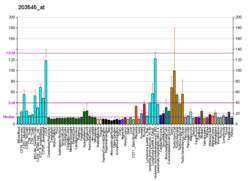ALG8

Probable dolichyl pyrophosphate Glc1Man9GlcNAc2 alpha-1,3-glucosyltransferase is an enzyme that in humans is encoded by the ALG8 gene.[5]
This gene encodes a member of the ALG6/ALG8 glucosyltransferase family. The encoded protein catalyzes the addition of the second glucose residue to the lipid-linked oligosaccharide precursor for N-linked glycosylation of proteins. Mutations in this gene have been associated with congenital disorder of glycosylation type Ih (CDG-Ih). Alternatively spliced transcript variants encoding different isoforms have been identified.[5]
References
[edit]- ^ a b c GRCh38: Ensembl release 89: ENSG00000159063 – Ensembl, May 2017
- ^ a b c GRCm38: Ensembl release 89: ENSMUSG00000035704 – Ensembl, May 2017
- ^ "Human PubMed Reference:". National Center for Biotechnology Information, U.S. National Library of Medicine.
- ^ "Mouse PubMed Reference:". National Center for Biotechnology Information, U.S. National Library of Medicine.
- ^ a b "Entrez Gene: ALG8 asparagine-linked glycosylation 8 homolog (S. cerevisiae, alpha-1,3-glucosyltransferase)".
Further reading
[edit]- Jaeken J (2005). "Congenital disorders of glycosylation (CDG): update and new developments". J. Inherit. Metab. Dis. 27 (3): 423–6. doi:10.1023/B:BOLI.0000031221.44647.9e. PMID 15272470. S2CID 7608163.
- Jaeken J, Carchon H (2004). "Congenital disorders of glycosylation: a booming chapter of pediatrics". Curr. Opin. Pediatr. 16 (4): 434–9. doi:10.1097/01.mop.0000133636.56790.4a. PMID 15273506.
- Adams MD, Kerlavage AR, Fleischmann RD, et al. (1995). "Initial assessment of human gene diversity and expression patterns based upon 83 million nucleotides of cDNA sequence" (PDF). Nature. 377 (6547 Suppl): 3–174. PMID 7566098.
- Stanchi F, Bertocco E, Toppo S, et al. (2001). "Characterization of 16 novel human genes showing high similarity to yeast sequences". Yeast. 18 (1): 69–80. doi:10.1002/1097-0061(200101)18:1<69::AID-YEA647>3.0.CO;2-H. PMID 11124703. S2CID 21397515.
- Oriol R, Martinez-Duncker I, Chantret I, et al. (2003). "Common origin and evolution of glycosyltransferases using Dol-P-monosaccharides as donor substrate". Mol. Biol. Evol. 19 (9): 1451–63. doi:10.1093/oxfordjournals.molbev.a004208. PMID 12200473.
- Strausberg RL, Feingold EA, Grouse LH, et al. (2003). "Generation and initial analysis of more than 15,000 full-length human and mouse cDNA sequences". Proc. Natl. Acad. Sci. U.S.A. 99 (26): 16899–903. Bibcode:2002PNAS...9916899M. doi:10.1073/pnas.242603899. PMC 139241. PMID 12477932.
- Chantret I, Dancourt J, Dupré T, et al. (2003). "A deficiency in dolichyl-P-glucose:Glc1Man9GlcNAc2-PP-dolichyl alpha3-glucosyltransferase defines a new subtype of congenital disorders of glycosylation". J. Biol. Chem. 278 (11): 9962–71. doi:10.1074/jbc.M211950200. PMID 12480927.
- Ota T, Suzuki Y, Nishikawa T, et al. (2004). "Complete sequencing and characterization of 21,243 full-length human cDNAs". Nat. Genet. 36 (1): 40–5. doi:10.1038/ng1285. PMID 14702039.
- Schollen E, Frank CG, Keldermans L, et al. (2004). "Clinical and molecular features of three patients with congenital disorders of glycosylation type Ih (CDG-Ih) (ALG8 deficiency)". J. Med. Genet. 41 (7): 550–6. doi:10.1136/jmg.2003.016923. PMC 1735831. PMID 15235028.
- Gerhard DS, Wagner L, Feingold EA, et al. (2004). "The status, quality, and expansion of the NIH full-length cDNA project: the Mammalian Gene Collection (MGC)". Genome Res. 14 (10B): 2121–7. doi:10.1101/gr.2596504. PMC 528928. PMID 15489334.
- Otsuki T, Ota T, Nishikawa T, et al. (2007). "Signal sequence and keyword trap in silico for selection of full-length human cDNAs encoding secretion or membrane proteins from oligo-capped cDNA libraries". DNA Res. 12 (2): 117–26. doi:10.1093/dnares/12.2.117. PMID 16303743.
- Kimura K, Wakamatsu A, Suzuki Y, et al. (2006). "Diversification of transcriptional modulation: large-scale identification and characterization of putative alternative promoters of human genes". Genome Res. 16 (1): 55–65. doi:10.1101/gr.4039406. PMC 1356129. PMID 16344560.
External links
[edit]- GeneReviews/NCBI/NIH/UW entry on Congenital Disorders of Glycosylation Overview
- Human ALG8 genome location and ALG8 gene details page in the UCSC Genome Browser.




